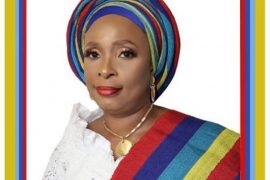Though women, world over, have remain vastly underrepresented at every level in key sectors of the economy, facing diverse challenges working in male-dominated industries, this significant gender divide have however not stopped Mrs. Happy Dzitse, Managing Director, McOttley Capital Limited in her determination to succeed in the fast-paced and dynamic male-dominated financial services sector.
Mrs. Dzitse who continues to enjoy a rewarding career in the financial sector, and contribute to the economic development of Africa, in an interview with Amazons Watch Magazine, says confidence and passion have been key to her success in Ghana’s financial services sector. She also discussed financial inclusion for women. Excerpt:
Thank you for this opportunity to interact with you. How would you describe yourself?
Thank you too for this opportunity. Whenever I am asked this question, my answer is always straightforward. I am a change agent and a game-changer. I keep this in mind in all that I do and that is how I always want to be identified. As legendary Michael Jackson’s hit song “Man in the mirror” says, if you want to make the world a better place, then take a look at yourself and make the change. My desire is never to stick to the status quo but bring positive change wherever I find myself. I try to go beyond the borders of race, religion and even gender and change the way things are done when I see the opportunity to make them better. So yes, I do describe myself as a game-changer.
You began your journey as a sales representative at Advance West Coast Marketing, but you have over the years risen to corporate leadership. Please tell us about your career journey.
I grew up at a time where the opportunities available to women weren’t as many as they are today. A woman had to work twice as hard as a man did to rise to the top. But my belief and conviction were in taking a day at a time and making the most out of each day. I did indeed begin as a sales representative at Advance West Coast Marketing but I had my eyes at the top. I believed I also had my quota to contribute to the world and if I find myself in the corporate world, then I needed to leave an indelible mark in the corporate world specifically in the world of finance.
From Advance West Coast Marketing, I trained as a professional teacher and taught for some years before joining the Standard Chartered Bank as a Direct Sales Representative. My pursuit to become an investment banker took me to Gold Coast Fund Management Limited, as a Sales Executive and Relationship Management Officer in 2006. I became an Authorized Dealing Officer on the Ghana Stock Exchange has acquired the required license to do so. I rose through the ranks at Gold Coast Fund Management Limited to become the Head of National Customer Service Centre responsible for strategic planning and implementation of customer service policies. I set up customer service procedures, and ensured compliance across all branches and regional offices of the company. I held this position until 2014 when I moved to McOttley Capital as the Chief Operating Officer then eventually became the Managing Director of the company in 2015.
Kindly share with us some of your experiences within male-dominated corporate boardrooms and industries.
The finance industry is indeed dominated by men and sometimes a woman needs to work harder to prove herself as capable. Anecdotal evidence suggests that, in the financial sector in Ghana, women make up less than 20% of corporate boards. This means that, for every 10 member board, less than 2 of them are women. I remember vividly after my appointment as the MD and needed to present my first budget to the board for approval. I knew I had to be smarter, think like the men, and process all the ideas as the men in order to sweep them off their feet. In fact, one had to be extremely cautious, confident and indeed straight to the point. This demanded a lot of hard work to get things done. As you engage with them over the years, your experience and expertise are brought to bear.
What has worked for me in this male-dominated corporate industry is confidence and being passionate about what I think is right. One has to be straight and strict to get the job done, delegate duties but monitor and receive feedback. But I also do all these with humility, open-mind and the fear of God.
Creating a bank account in a formal financial institution is the first and most important step towards achieving financial inclusion. Findings by the World Bank reveal that only 34% of adults in Sub-Saharan Africa hold bank accounts in a formal financial institution, and only 30% of those formal accounts are held by women compared to 39% held by men. Women in developing nations have long been excluded from formal financial processes and have had to turn to the informal sector (savings schemes and cash transfers) to support unmet financial needs. What is your take on gender disparity in terms of financial inclusion?
These statistics by the World Bank for Sub-Saharan Africa are not encouraging and need to be improved. Africa has been the world’s second fastest-growing region after Asia, with annual GDP growth rates in excess of 5% over the last decade. Now, despite this growth, good economic growth in the continent has not translated into shared prosperity and better livelihoods for the majority. Growth has to be inclusive to be socially and politically sustainable.
One key component of inclusive development is a financial inclusion-an area in which Africa has been lagging behind other continents. Making formal financial services Available, Accessible and Affordable to all segments of the population including women is critical.
According to data from the World Bank, in 2010 a relatively large segment of the Ghanaian population (44.0%) was excluded from the financial services sector altogether. During this period, access to formal banking services hovered around 34.0%, with banks creating innovative channels to penetrate the market further. By 2015 however, the segment of the population excluded from the financial services system had dropped to 25.0%, according to the same report by the World Bank. In all these women are the most affected.
However, recently, the trend is gradually changing with some drastic improvement in women having access to financial services across Africa. The introduction of mobile money platform has created an enabling environment where the rural poor particularly women are having access to basic financial services. In Nigeria, Kenya, Uganda and Ghana the gender disparity in financial services and inequality has improved tremendously, but more needs to be done.
As an investment banker, how do you think Africa can scale up access to affordable finance for female budding entrepreneurs in Ghana?
First of all women entrepreneurs need to be given the required skills, knowledge and training in their respective fields of endeavour. I also think that a lot more women need to be empowered and motivated to be entrepreneurial and to take up the challenge of creating wealth for themselves.
The cost of borrowing across many African countries is very high, with average lending rates in Ghana hovering about 25% to 35% per annum, making it very challenging to have access to affordable financing. This phenomenon has crippled many of SME’s in Africa. The solution lies in building resilient economies where credit is made available to the private sector for growth. There has to be a conscious effort by the Government in making available credit and affordable funds to potential women entrepreneurs who have set up SMEs and employing the graduate youth. The government must make it a priority to nurture, develop and fund women with the potential to grow their businesses and contribute significantly to economic growth in Africa.
What are some of your efforts in making inroads for women in Ghana?
Influence usually begins within your own space. As an MD, I have a strict policy against denying women the opportunity to hold certain positions just because they are women. McOttley Capital gives equal opportunities to both women and men. When a woman is qualified to hold a position, there is no way she will be overlooked just because of her gender or because it is a man’s world. Also, my belief is that women in Ghana and even the world at large cannot penetrate the corporate world or even the entire job market without the requisite education. You cannot get to the top just because you are a woman and the world is advocating for women at the top. You will struggle there if you do not have the skills and knowledge to make a difference. For this reason, through our foundation, McOttley Empowerment Foundation we offer scholarships to many women to pursue higher education. I have a thing against money being a stumbling block to pursuing your dreams so in whatever way I can I help as an individual or my company can, we do so.
How do you balance your career and family obligations?
I won’t deny that combining being a corporate woman and family woman hasn’t been easy. Many at times I have noticed that women in such situations end up giving up one for the other but I believe that with proper planning and strict adherence to the plans, any corporate woman can have the best of both worlds. You do not have to give up one to have the other. My personal secret is not to waste any time, not even a single second. It’s amazing what you can achieve as a corporate and family woman when you make good use of the 24 hours God has given you. I try and do all that I have to do within a stipulated time so that it doesn’t have to eat into my family time. On the rare occasion that it does, I still make proper use of technology to be a part of the lives of my husband and children. I must also state that my husband has been very supportive in my corporate life, he is my superhero when it comes to my corporate journey in my view. I believe Women have great potentials to do a lot but with a good partner by their side, they can do more.
What is the best way for readers of Amazons Watch Magazine to connect with you (Optional)?
Readers of Amazons Watch Magazine can follow me on Twitter, Facebook, Linkedin and Instagram.




